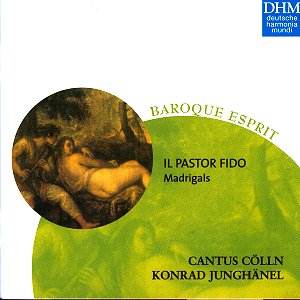G. Battista Guarini was a late 16th century
poet who entered the services of the d'Este Dukes of Ferrara in 1567.
In 1579 he replaced Tasso as court poet on Tasso's loss of sanity and
subsequent incarceration. Guarini composed the majority of his verses
in the 8 years following this appointment. His fame as a poet rests
mainly on his poetic drama 'Il Pastor Fido', the prototype of the classical
pastoral tragi-comedy. It was published in 1590 and received its first
performances in 1596. The plot is set in Arcadia and involves the trials
and tribulations of two pairs of lovers and two villains.
The drama served as a major source of madrigal and
monody texts for composers writing between 1591 and 1626. The last known
setting of Guarini's work seems to be from 1678. In total over 125 composers
wrote around 550 madrigals based on Guarini's work. The extant printed
madrigals and monodies use over one-fifth of the entire text of 'Il
Pastor Fido'.
Faced with such a bewildering number of madrigals to
choose from, Konrad Junghänel and Cantus Cölln have assembled
this attractive programme of 18 madrigals from 14 different composers.
One area not covered in the booklet, is whether the composers represented
on this disc could be said to share some quality as a result of their
choosing to set Guarini's texts. The concept behind the CD rather invites
this sort of speculation, but realistically this is something for an
academic thesis. Our main concern lies with the performances of the
music.
Cantus Cölln were formed in 1987 by the lutenist
Konrad Junghänel and has subsequently developed into one of the
most exciting groups on the early music scene. This recording comes
from quite early on in their recording career. All the singers are fine
soloists in their own right and the group specialises in a sound in
which the different performers retain their identity rather than producing
a homogenised sound.
The disc contains a variety of types of madrigal; monody,
homophonic madrigals and more complex polyphonic ones. I found the madrigals
that worked the best were the homophonic ones. In the more complex items
there are too many little moments where individual lines are smudged,
slight problems with tuning and a general lack of cohesion between the
individuals. Notwithstanding their reputation, this disc feels like
an early experiment which has not yet succeeded, more of a work in progress.
The five singers do not always coalesce and sometimes sound like five
disparate individuals. The attention to detail is also lacking when
it comes to the words. Diction can be poor, which is a shame on a disc
devoted to texts by a single poet. And more problematically, the emotions
can sound a little generalised rather than springing directly out of
the text and the music. Since this recording was made, styles of performance
of this music have developed and we have become more accustomed to a
passionate delivery of this style of music. The recorded balance is
fine for the singers, but I found that the lute was generally a little
too quiet. At times it was just a faint plucking in the background rather
than the support for that singers. But the singers have been recorded
very closely so that the music seems to lack any space to breathe. This
music would have been sung in chambers rather than in churches, so a
generously resonant acoustic is not necessarily suitable. But I feel
the current recording errs to far on the side of dryness.
But these are details, this is still an attractive
programme, in the main stylishly sung. The majority of items involve
most of the members of the group, though David Cordier (countertenor)
and Gerd Türk contribute attractive solo items (Domenico Maria
Melli's 'Io moro e consolato' and Claudio Saracini's 'Udite lagrimosi
spirti d'Averno). Cordier and Johanna Koslowsky (Soprano) charm in their
duet, 'Ah dolente partita' by Stefano Barnardi and Gerd Türk and
Wilfried Jochens (Tenors) sing Alessandro Grandi's lovely 'Udite labrimosi
spirti d'Averno'. This is one of the 3 items which duplicate texts.
It makes a fascinating exercise seeing how the different composers tackle
the same or similar texts. I could have wished for more of this. though
I would have liked to have seen the printed texts. The booklet usefully
relates the individual items to the original drama, but there are no
printed texts, which is a great loss.
This is an attractive programme, full of items which
are insufficiently recorded, I only wish I could be more enthusiastic.
Of course, not everyone will agree with my comments on the performance
and its style, but at such a reasonable price I urge you to try it and
see for your self.
Robert Hugill


